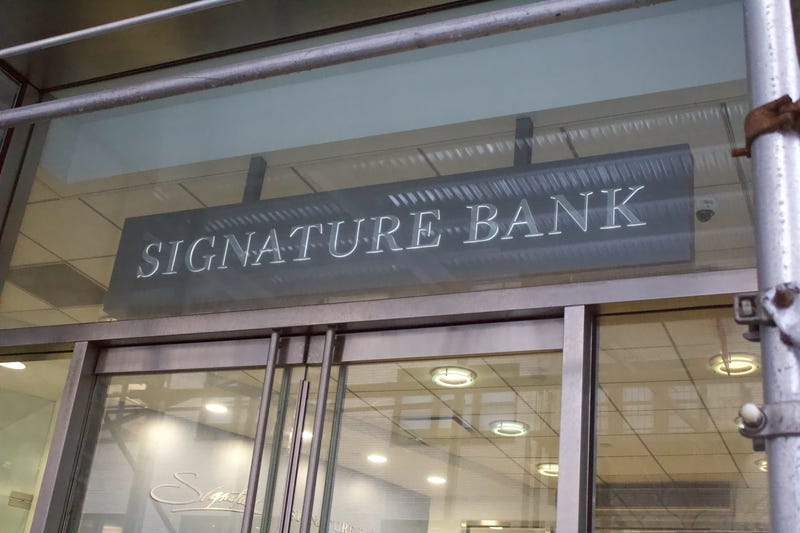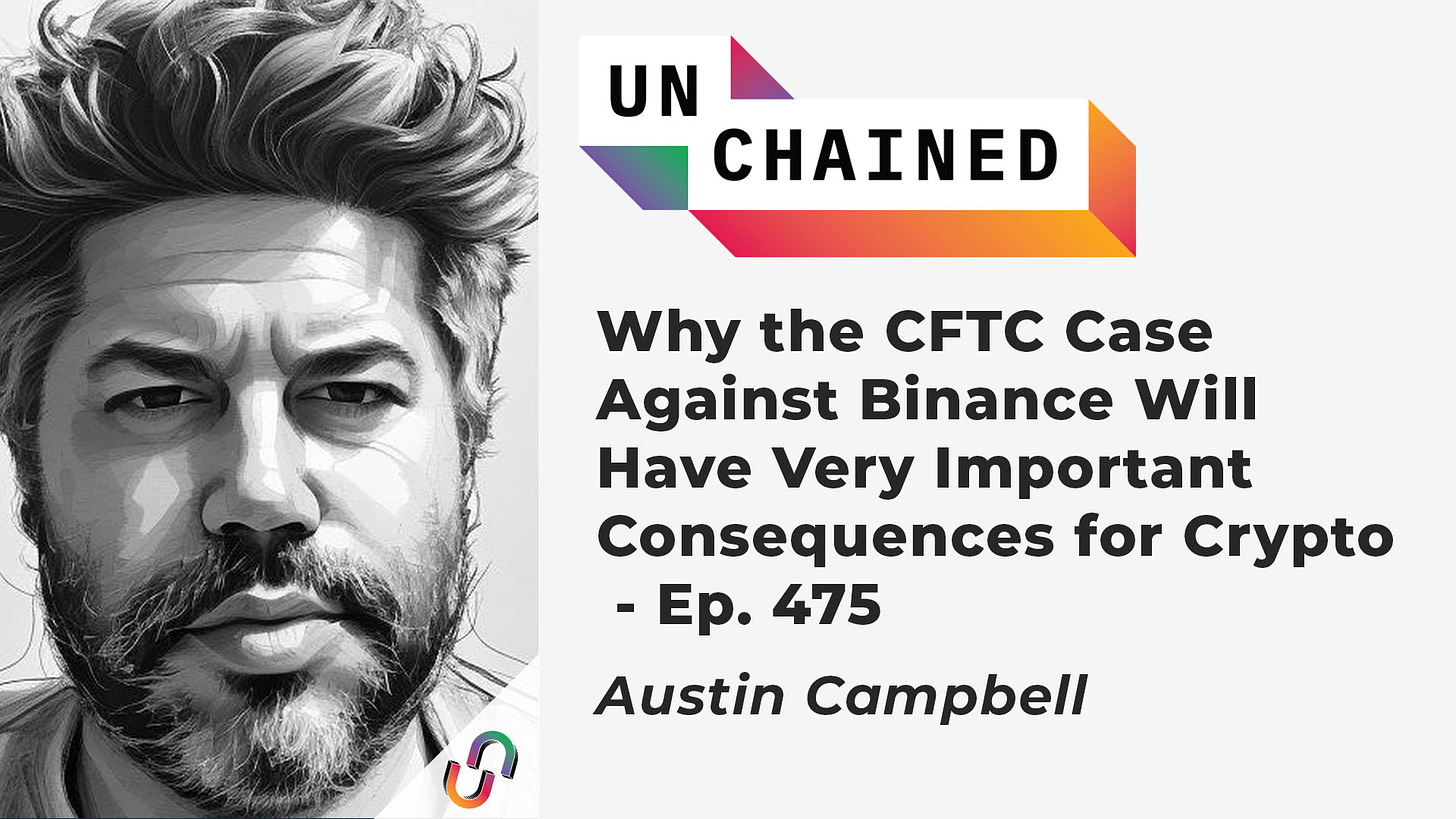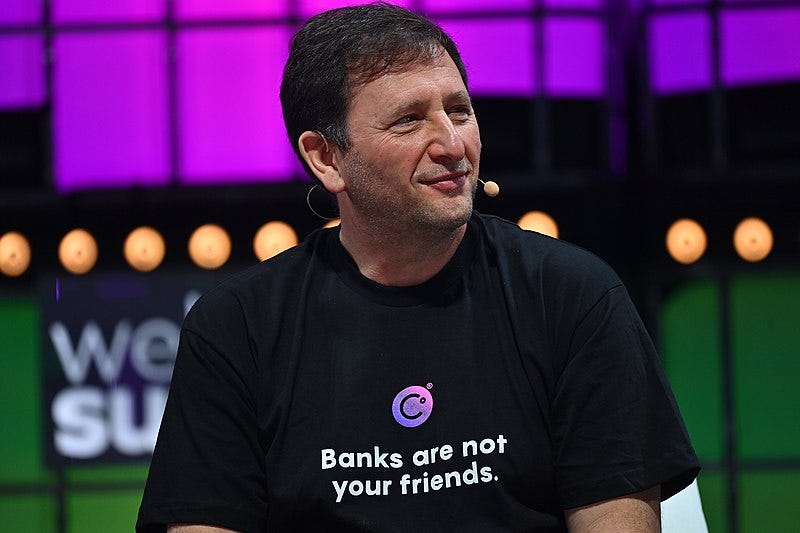💲 SBF’s $40 Million Bribery; Jurisdictional Fight Over Do Kwon 🤼
Weekly News Recap: 🎙️ New pod on the CFTC lawsuit vs. Binance, 🫱 SBF is accused of bribery, ⛓️ Do Kwon's possible extradition, 🧵 Binance's ties with China, and more ❕
Why the CFTC Case Against Binance Will Have Very Important Consequences for Crypto
In this episode of Unchained, Columbia Business School professor Austin Campbell, unpacks the Commodity Futures Trading Commission’s lawsuit against Binance — and addresses the question of whether Binance CEO Changpeng Zhao (CZ) could face criminal charges.
He predicts one of two outcomes in this case, one of which is that Binance tries to defend itself. If so he says, “they're going to open themselves up to discovery,” and if worse things come out, he says the odds of DOJ action go up. On the other hand, he says, the allegations are from 2019 and 2020, so if Binance was already deeply into the process of fixing it, “that's going to be see received very differently than if it's still kind of an ongoing tire fire.”
We also cover why this case could settle one of the biggest questions in crypto once and for all: are crypto assets such as ether securities or commodities? Be sure not to miss it!
Weekly News Recap
SBF Faces More Accusations
Sam Bankman-Fried, the founder of the collapsed cryptocurrency exchange FTX, is now dealing with new charges.
Prosecutors allege that Bankman-Fried bribed Chinese government officials with a $40 million cryptocurrency payment in November 2021 to unfreeze certain Alameda accounts. These accounts, collectively holding $1 billion worth of crypto, were frozen during an investigation into an Alameda counterparty. After several unsuccessful attempts to unfreeze the accounts, SBF reportedly directed Alameda employees to execute a portion of the bribe payment, authorizing additional tens of millions of dollars after the accounts were unfrozen.
In a court appearance on Thursday, through his lawyer Mark Cohen, the founder of FTX pleaded not guilty to these charges of attempting to bribe Chinese officials and evading campaign financing laws.
Amid mounting legal fees, Forbes revealed that SBF's defense costs are being covered by a multi-million dollar gift he made to his father, Stanford Law professor Joseph Bankman, which itself had been funded by a loan from FTX's sister company, Alameda Research. The funds were transferred in 2021 as a tax-free gift using SBF's lifetime estate and gift tax exemption.
As he prepares for trial in October, SBF faces new bail restrictions focused on his use of electronic devices and encrypted messaging services. His internet access will be limited to pre-approved websites on a new laptop assigned to him, and all user activity will be logged and monitored by his legal counsel.
U.S. and South Korea Vie to Extradite Do Kwon
Terraform Labs cofounder Do Kwon and chief financial officer Han Chang Joon have been arrested in Montenegro, facing extradition requests from the U.S. and South Korea, according to Justice Minister Marko Kovac. The duo will first face criminal proceedings for ID document forgery in Montenegro. The international warrant was issued after the collapse of the TerraUSD (UST) stablecoin last year, which wiped $40 billion from the crypto market. The U.S. claims jurisdiction because the Securities and Exchange Commission accuses Kwon and his company of defrauding American investors.
Kwon and Joon entered Montenegro illegally and were arrested while attempting to fly to Dubai using falsified travel documents. Prior to their arrest, South Korean officials were searching for Kwon in Serbia. Authorities seized three laptops and five mobile phones from them during the arrest. Interior Minister Filip Adzic told Bloomberg that the duo seemed surprised about their arrest and told authorities that they had previously enjoyed VIP treatment while on the run.
Kwon faces multiple charges from South Korean and U.S. authorities for his role in the collapse of LUNA and UST, and is planning to appeal a Montenegrin court's order for a month-long detention.

Binance Allegedly Hid Presence China
On top of the CFTC lawsuit, Binance was accused of hiding its links to China for several years, according to internal company documents seen by the Financial Times. The documents suggest that Binance operated an office in China until at least the end of 2019 and used a Chinese bank to pay employee salaries. Binance CEO Changpeng Zhao and other senior executives are said to have instructed employees to hide the company's presence in China.

Genesis Had Privileged Access to FTX’s Tokens
According to a Financial Times report, Genesis, a major crypto lender that filed for bankruptcy earlier this year, had privileged early access to issuances of tokens backed by FTX at a discounted rate before they were made available to the public. Genesis is FTX and Alameda's biggest creditor, with $226 million owed, according to US bankruptcy court records.
Thomas Braziel, a bankruptcy expert, said: “If this is true Genesis shouldn't be on the UCC [Unsecured Creditors Committee].”
Also this week, the sale of $45 million of FTX's assets in Sequoia Capital Fund was approved by a federal bankruptcy judge in Delaware. The buyer was Abu Dhabi's investment arm, Al Nawwar Investments RSC Limited. The sale meets the requirements of US bankruptcy law, which sets restrictions to prevent unduly hasty divestment of assets. Meanwhile, the sale of FTX's stock-clearing business Embed was put on hold until further notice.
On a related note, crypto exchange OKX announced that it identified $157 million in digital assets belonging to FTX and Alameda and is turning them over to the bankruptcy estate.
FDIC Gives a Deadline to Signature’s Digital Asset Clients
The Federal Deposit Insurance Corp (FDIC) instructed Signature Bank's digital asset clients to close their accounts by April 5. In the sale of Signature to Flagstar Bank, approximately $4 billion worth of crypto-related deposits were excluded from the deal. The FDIC informed these depositors that any funds remaining in their accounts after the deadline would be mailed to them as a check. During the acquisition, Flagstar took over $88.6 billion in deposits and $110.4 billion in assets from Signature’s 40 branches.

Additionally, on Wednesday, FDIC Chair Martin Gruenberg faced questions from the House Financial Services Committee members regarding the agency's handling of Signature Bank's digital asset business. Gruenberg stated that the FDIC is currently marketing Signet, Signature Bank's crypto-focused payments network, for sale.
Furthermore, Nellie Liang, US Treasury's Under Secretary for Domestic Finance, assured the House Financial Services Committee that the recent failures of Silicon Valley Bank and Signature should not be blamed on the crypto industry. "I don't believe that crypto played a direct role in either of the failures," she said.
U.S. Law Firm Accuses Regulators of Going After Crypto
Washington D.C. law firm Cooper & Kirk published a white paper suggesting that US regulators, including the FDIC, Federal Reserve Board, and the Office of the Comptroller of the Currency (OCC), are secretly targeting the crypto industry in a financial war similar to the first Operation Choke Point.
The paper highlights the recent closure of Signature Bank's $4 billion digital asset business and the increasing number of crypto firms losing access to the ACH payment network. Cooper & Kirk previously sued the FDIC, Federal Reserve, and OCC over the original Operation Choke Point, which pressured banks to cut ties with high-risk businesses. The firm now urges Congress to hold regulators accountable and halt "Operation Choke Point 2.0," which they say is targeting the crypto industry.
Castle Island Ventures’ Nic Carter, who has been raising the alarms of Operation Choke Point 2.0 for weeks now, tweeted, “This really is an exceptional document,” calling it “essential reading.”
Court Summons 3AC Founders to BVI
Founders of Three Arrows Capital (3AC), Kyle Davies and Su Zhu, are required to appear in a British Virgin Islands court on May 22, in relation to the ongoing liquidation process of their collapsed crypto hedge fund. If they do not respond to the summons, they will be held in contempt of court. The founders must submit all pertinent documents concerning the firm's bankruptcy by April 14.
DAO Token Holders Face Liability in bZx DAO Case
A U.S. court in California ruled that bZx DAO token holders may be held liable for the protocol's $55 million hack in 2021. The court classified bZx DAO as a general partnership, suggesting that token holders owe a duty of care to investors. This decision marks a significant development in the legal landscape concerning the liability of governance token holders in decentralized autonomous organizations (DAOs). However, as Gregory Schneider, deputy general counsel at Hedera, pointed out, “It is an early ruling and does not decide liability.”
The bZx platform, a DeFi margin trading protocol, suffered a hack in 2021 when a team member fell victim to a phishing exploit. The attackers stole $55 million, with individual plaintiffs losing between $800 and $450,000. The court ruling supports the plaintiffs’ argument that token holders failed to ensure adequate security to prevent the hack.
Voyager Digital Transfers $150M in USDC to Circle
Bankrupt crypto lender Voyager Digital transferred $150 million in USDC stablecoin to Centre, the joint venture between Coinbase and Circle, as part of its ongoing effort to offload crypto assets.
Despite objections from regulators such as the SEC, the New York Department of Financial Services, and the New York Attorney General, who argue that Voyager's actions may violate securities laws, the company is attempting to convert its crypto assets into U.S. dollars.
In spite of the recent lawsuit filed by the CFTC against Binance, legal experts suggest that the case is unlikely to have a significant impact on Binance's acquisition of Voyager's assets.
Paxful to Reimburse Celsius Earn Users
Peer-to-peer Bitcoin marketplace Paxful is set to refund Celsius Earn users on its platform following the latter's bankruptcy.
Paxful CEO Ray Youssef committed to using the company's funds to compensate affected users, who were unable to access their assets after Celsius halted withdrawals.
Youssef said on Twitter: “Paxful, like many others, were paralyzed to act as we could not retrieve funds held by Celsius.”
While some Celsius users with Custody accounts have resumed withdrawals, those with deposits through partnerships such as the one Paxful had face a more uncertain future.
Euler Hacker Returns 51,000 ETH
Over the weekend, the individual behind the Euler hack returned 51,000 ETH (worth around $91 million) to the protocol, causing the EUL token to surge by 60% in 30 minutes. The hacker still holds $73 million in ETH and $43 million in DAI from the $190 million exploit. The return of the stolen funds followed a series of interactions between the hacker and the Euler team via encrypted blockchain messages. Despite an attempted phishing attack by the Ronin bridge exploit hacker, the Euler hacker proceeded to return the majority of the stolen funds.
Polygon zkEVM Launches on Mainnet
Polygon's zero-knowledge proof rollup network, zkEVM, launched on the mainnet with over 50 dApps and infrastructure providers integrating it from day one. Ethereum cofounder Vitalik Buterin executed the first transaction, celebrating the network's potential for unconstrained scalability.
“Millions of constraints for man, unconstrained scalability for mankind,” said Buterin in an embedded message.
The zkEVM technology aims to scale Ethereum by moving computation and state-storage off-chain. Polygon has also made it open-source.
On a related note, ConsenSys launched a public testnet for its zkEVM solution dubbed "Linea," following the processing of over 1.5 million transactions during its private beta. The Linea testnet features native MetaMask and Truffle integrations.
If you are still not familiar with zero knowledge technology, I highly recommend you to listen to this Tuesday’s episode of Unchained, in which I talked with Stanford cryptography professor Dan Boneh and a16z General Partner Ali Yahya to do a deep dive into the topic.
Speaking about developments around Ethereum, its core developers confirmed that the Shapella network upgrade will be implemented on the Ethereum mainnet on April 12. Be sure to check out my recent interview with Christine Kim of Galaxy Digital to find out what’s included in the Shapella upgrade and how it might affect Ethereum.
Meanwhile, the MakerDAO community approved a new "Constitution" proposal that lays out guiding principles for the decentralized lending protocol and outlines plans for "Endgame," a major restructuring initiative for the platform pushed by its founder Rune Christensen.
FUN BITS
This week, Ginny Hogan of Unchained gives her take on Do Kwon’s arrest:
If you enjoyed this, don’t forget to follow Unchained on all social media platforms. Find the links below ⬇️
🔗Join Unchained Premium to get access to:
🎙️ Behind-the-scenes interviews, in which I talk with crypto experts and entrepreneurs to learn all about the latest developments in the industry.
💬 A subscriber-only Telegram group, where you can talk with the other members of the Unchained community, build a network in crypto, and talk directly with me and the Unchained team!
📰 Transcripts of all the shows, for subscribers only.
If you liked what you read:
👍 follow me on Twitter, Facebook, Instagram, TikTok, Mastodon and/or LinkedIn
🎧 subscribe to Unchained on YouTube, Apple Podcasts, Spotify, Google Podcasts, Pandora or wherever you get your podcasts
👯♀️ share Unchained with a friend
and/or 📚buy my book, The Cryptopians: Idealism, Greed, Lies, and the Making of the First Big Cryptocurrency Craze







